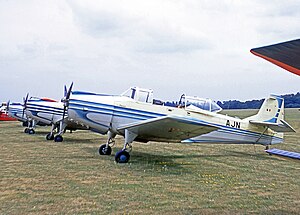Nord 3202
| 3202 | |
|---|---|

| |
| Three Nord 3202B of the French Army at Middle Wallop Army Air Corps airfield in 1969 | |
| Role | Trainer |
| National origin | France |
| Manufacturer | Nord |
| First flight | 17 April 1957 |
| Primary users | French Army private pilot owners |
| Number built | 101 |
The Nord Aviation 3202 was a 1950s French military trainer aircraft designed and built by Nord Aviation to meet a French Army requirement for a two-seat basic trainer, as a replacement for the biplane Stampe SV.4. Altogether, 101 examples were built, with the first flying on 17 April 1957.
Design[]
The 3202 was a cantilever low-wing monoplane with a fixed tailwheel landing gear and a nose-mounted inline piston engine. It had an enclosed cockpit for pupil (front) and instructor (rear) in tandem.
Operation[]

The Nord 3202 was used as a military training aircraft. After retirement from military use, many examples were sold to the civilian market, including several now (2012) flown in the United States.
Variants[]
- Nord 3200
- Prototype with a 240hp (179kW) Salmson 8AS-04 engine.
- Nord 3201
- Prototype with a 170hp (127kW) Regnier 4L-22 engine.
- Nord 3202
- Production aircraft with a 179 kW (240 hp) Potez 4D-32 engine, 50 built.
- Nord 3202B
- Production aircraft with a 194 kW (260 hp) Potez 4D-34 engine, 50 built.
- Nord 3202B1B
- modified by Aérospatiale for use by the in aerobatic competitions. Larger ailerons, lower weight, new landing gear, and variable-pitch propeller.
- Nord 3212
- Redesignation for 3202s fitted with radio compass and equipped for instrument flight training.
Operators[]
Specifications (N 3202)[]
Data from Jane's All The World's Aircraft 1962–63[1]
General characteristics
- Crew: 2
- Length: 8.12 m (26 ft 8 in)
- Wingspan: 9.50 m (31 ft 2 in)
- Height: 2.82 m (9 ft 3 in) in flying attitude
- Wing area: 16.26 m2 (175.0 sq ft)
- Empty weight: 824 kg (1,817 lb)
- Gross weight: 1,220 kg (2,690 lb)
- Powerplant: 1 × Potez 4D-32 four-cylinder air-cooled inline engine, 180 kW (240 hp)
- Propellers: 2-bladed Ratier Type 23-92, 2.25 m (7 ft 5 in) diameter adjustable-pitch propeller
Performance
- Maximum speed: 260 km/h (160 mph, 140 kn)
- Cruise speed: 195 km/h (121 mph, 105 kn)
- Stall speed: 83 km/h (52 mph, 45 kn)
- Range: 1,000 km (620 mi, 540 nmi)
- Wing loading: 75 kg/m2 (15 lb/sq ft)
- Power/mass: 0.197 kW/kg (0.120 hp/lb)
See also[]
Aircraft of comparable role, configuration, and era
- de Havilland Chipmunk
- Fokker S-11
References[]
- ^ Taylor, John W.R., ed. (1962). Jane's All the World's Aircraft 1962-63. London: Sampson Low, Marston & Co. pp. 48–49.
Further reading[]
- Bridgman, Leonard, ed. (1957). Jane's All the World's Aircraft 1958-59. London: Jane's All the World's Aircraft Publishing Co. Ltd. p. 161.
- Taylor, John W. R. (1961). Jane's All The World's Aircraft 1961–62. London: Sampson Low, Marston & Company, Ltd. p. 62.
- Taylor, Michael J. H. (1989). Jane's Encyclopedia of Aviation. London: Studio Editions. p. 33.
External links[]
| Wikimedia Commons has media related to Nord 3202. |
- 1950s French military trainer aircraft
- Aérospatiale aircraft
- Nord aircraft
- Single-engined tractor aircraft
- Low-wing aircraft
- Aircraft first flown in 1957